Kazakhstan marks 31 years since joining UN, remains committed to international principles and multilateralism

Kazakhstan became a member of the UN on March 2, 1992. The Permanent Mission of Kazakhstan to the UN in New York was established on June 5, 1992.

UN Headquarters in New York. Photo credit: Kazakhstan’s Permanent Mission to UN
Almost one year later, the first premises of the UN Office in Kazakhstan were opened in Kazakhstan hotel in Almaty, with Nigel Ringrose becoming the first Permanent Representative of the UN in Kazakhstan.
Since then, Kazakhstan has built a multi-vector, balanced foreign policy, fully supporting the activities and efforts of the UN in addressing global international challenges.

Kazakh Foreign Minister – Deputy Prime Minister Mukhtar Tileuberdi visits the newly named UN Plaza in Almaty in February 2023. Photo credit: MFA Kazakhstan
«Our country reaffirms its firm adherence to the Charter of the organization and the principles of international law. The UN remains indispensable as the only universal organization serving the interests and urgent needs of all humankind,» reads the statement from the Ministry of Foreign Affairs published on the ministry’s website on February 16.
Kazakhstan and the UN signed a UN Sustainable Development Cooperation Framework (UNSDCF) in 2020 for 2020-2025, focusing on three thematic areas - Human Development and Equal Participation, Effective Institutions, Human Rights and Gender Equality, and Inclusive Economic Growth and Environmental Sustainability.
In September 2019, President Tokayev, who served as Deputy Secretary General of the UN and General Director of the UN Office in Geneva in 2011-2013, visited New York to participate in the 74th session of the UN General Assembly, where he met with the UN Secretary-General Antonio Guterres and attended the SDG Summit and the UNGA General Debate.
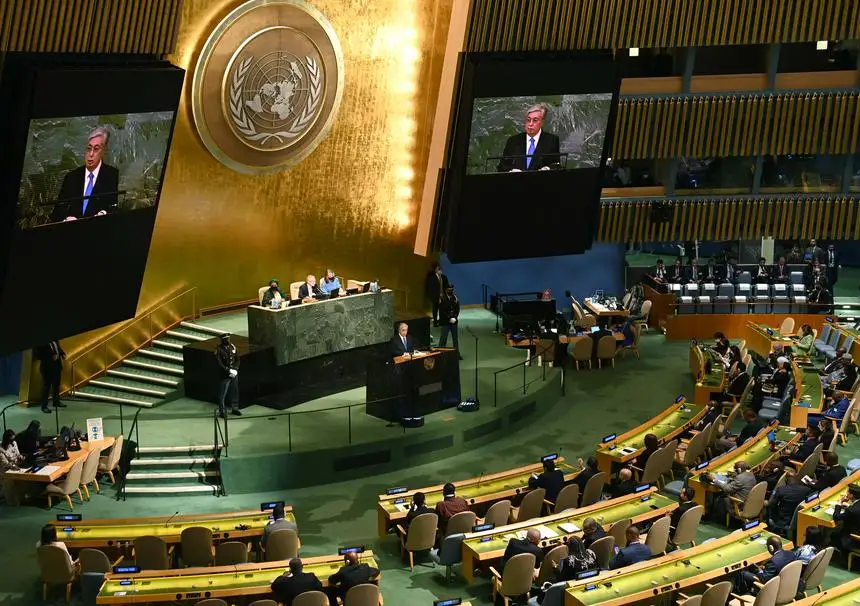
Tokayev delivers remarks at UNGA General Debate in September 2022. Photo credit: Akorda.kz
In the next two years, UNGA sessions took place in a virtual format because of the ongoing pandemic, which Tokayev also addressed.
His latest visit to the UN headquarters was in September 2022 to take part in the 77th session of the UNGA. He attended the Global Summit on Food Security, and General Debate and held a bilateral meeting with the UN Secretary-General Guterres. Back then, he said the world was facing a critical time for humanity and had seemingly entered a new period of growing geopolitical confrontation.
«The long-standing international system - based on order and responsibility is giving way to a new, more chaotic and unpredictable one. The global system of checks and balances has failed to maintain peace and stability. The security architecture is eroding. Mutual distrust between global powers is dangerously deepening. The world is falling prey to a new set of military conflicts. For the first time in two generations, we face the prospect of the use of nuclear weapons, and not even as a last resort,«the President said, emphasizing the need to rethink the relationship between the three primordial principles – the sovereign equality of states, the territorial integrity of states and peaceful coexistence between states.
Kazakhstan’s activities at the UN
Kazakhstan’s activities in the UN span several key priorities. They include peace and security, peacekeeping and sustaining peace, disarmament and non-proliferation, counterterrorism, and sustainable development.
The country’s foreign policy concept for 2020-2030 highlights the country’s firm commitment to multilateralism and constructive foreign policy, where the UN plays an important role.
«Since independence, our country has strengthened its position in the international arena, established itself as a peaceful and open state, a reliable partner in global and regional affairs. Kazakhstan is implementing a multi-vector, pragmatic and proactive foreign policy, makes a significant contribution to the formation and implementation of the global and regional agenda in the field of security, cooperation and development. At the same time, the main focus is on comprehensively and resolutely upholding the national interests, and constructively promoting foreign policy and foreign economic priorities,» reads the document.
Restoring and strengthening the «atmosphere of trust» in international relations on the basis of the goals and principles of the UN Charter, promoting multilateral interaction on the basis of equality and compromise stand among the nation’s key priorities in the international arena.
Peace and security
The country’s steadfast commitment to peace and security is in line with that of the UN. Peace and security, development and human rights are the bedrock of Kazakhstan’s foreign policy.
Over the years of being a UN member, Kazakhstan has made every effort to contribute to the peaceful settlement of disputes through preventive diplomacy, dialogue and negotiations. The importance of dialogue has been a cornerstone of President Kassym-Jomart Tokayev’s international appearances.
Since 2017, Kazakhstan has hosted 19 rounds of the Astana Process on Syria to facilitate UN efforts to resolve a decade-long conflict.
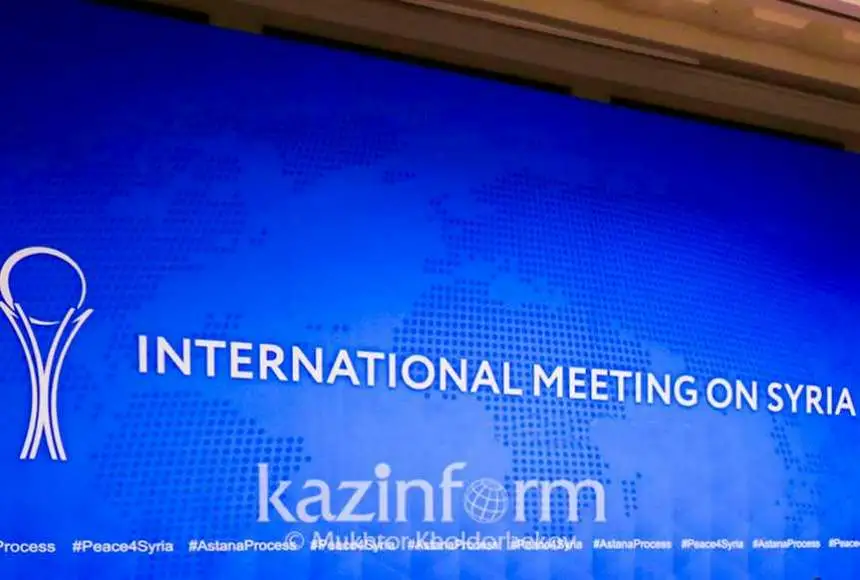
Kazakhstan was also one of the first to repatriate its citizens, primarily children and women, from conflict zones in the Middle East.
Kazakhstan also pioneered such initiatives as the UN Regional Center for Preventive Diplomacy for Central Asia (UNRCCA), the Central Asian Nuclear-Weapon-Free-Zone, and the Conference on Confidence-Building Measures in Asia (CICA), among others.
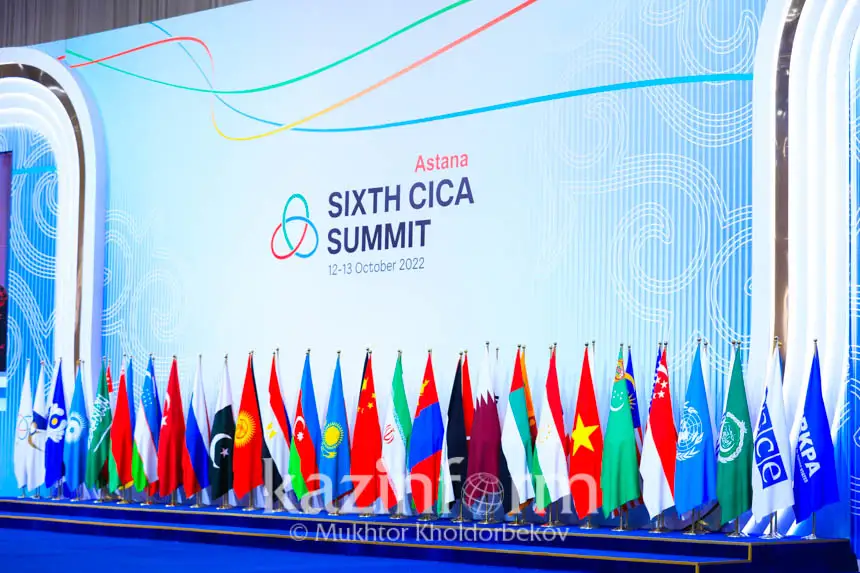
CICA was, in fact, one of the first international initiatives of Kazakhstan put forward at the 47th session of the UN General Assembly in 1992. From just a mere idea, CICA, a multi-national forum of 28 member states for enhancing cooperation toward promoting peace, security, and stability in Asia, has evolved into an international organization, the process that was launched at the sixth CICA summit in Astana on October 12-13.

On February 22, Kazakh Deputy Foreign Kanat Tumysh and CICA Secretary General Kairat Sarybay signed the roadmap on the Kazakh chairmanship’s priorities in the CICA for 2023-2024, including CICA’s institutional development, implementation of the Catalogue of Confidence Building Measures, promotion of the Business and Youth Councils.
Established in 2007 in Ashgabat, UNRCCA is another example of how Kazakhstan contributes to peace in the region. UNRCCA is designed to foster dialogue between the Central Asian countries to address emerging problems and potential threats, maintaining engagement with international organizations operating in the region.
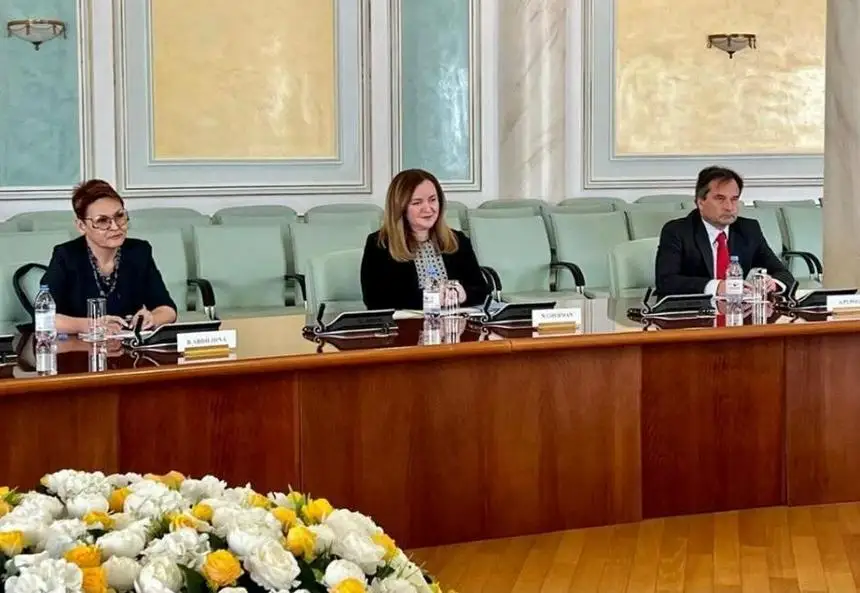
Natalia Gherman during her visit to Astana on February 2. Photo credit: MFA Kazakhstan
«Kazakhstan is interested in ensuring peace and security in the region and the sustainable development of the Central Asian countries. Therefore, we note the timeliness of continuing numerous creative processes in the Central Asian region, emphasizing the important role of the UN in this process,» said Kazakh First Deputy Minister Kairat Umarov on February 2 during his meeting with head of UNRCCA Natalia Gherman, who completed her mission.
Peacekeeping and sustaining peace
Kazakhstan's foreign policy emphasizes the importance of promoting peace and stability within the country and beyond its borders. As part of this, Kazakhstan has actively supported UN peacekeeping efforts, both as a troop contributor and as a non-permanent member of the UN Security Council in 2017-2018.
Kazakhstan has deployed peacekeepers to the UN Interim Force in Lebanon (UNIFIL) since October 2018, with the first 120 peacekeeping officers departing to Lebanon on October 31, 2018. The mission was established to help ensure the cessation of hostilities between Israel and Lebanon and to assist the Lebanese government in restoring its authority in the south of the country.
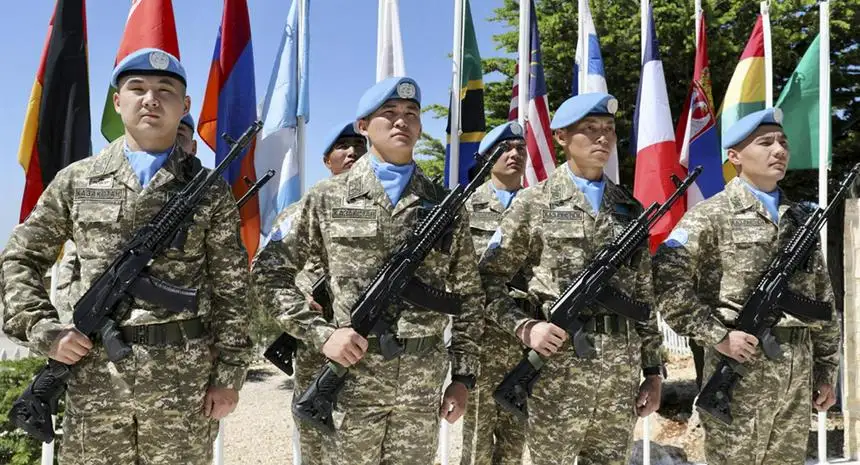
Kazakhstan’s peacekeeping officers. Photo credit: Kazakh Ministry of Defense
524 officers of the Armed Forces participated in UNIFIL as part of the Indian Battalion. The latest seventh peacekeeping contingent of the Armed Forces of Kazakhstan completed its participation in the UNIFIL in October 2022.
The country has contributed troops, police officers, and military observers to several UN missions, as well as provided financial and logistical support.
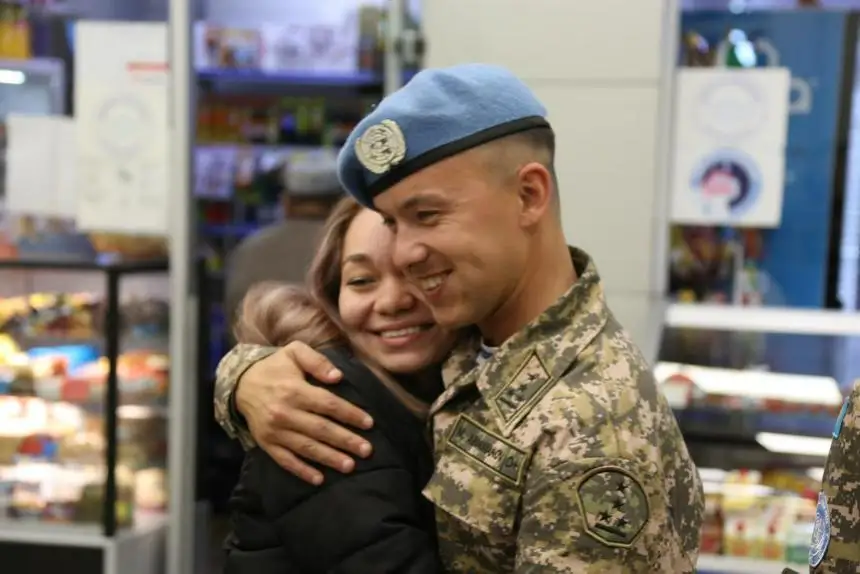
The seventh peacekeeping contingent arrived in Almaty in October, while the eighth departed on its mission. Photo credit: Kazakh Ministry of Defense
For six months, Kazakh officers were in charge of guarding, participated in the organization of checkpoints, base security, and daily combat training of non-operational personnel.
«Six months flew by quickly. The in-depth training at the Peacekeeping Training Center helped us adapt easily to the new environment and handle the tasks with dignity. The moral and psychological state of the service officers is at a high level, they are ready for the fulfillment of tasks in the place of service,«said captain Marat Abdramanov upon arrival in Almaty.
Beginning in 2014, 39 officers of the Armed Forces participated in the UN missions in Western Sahara (MINURSO) and Côte d'Ivoire (UNOCI).
Two staff officers of Kazakhstan’s Armed Forces were sent to the headquarters of the UN Multidimensional Integrated Stabilization Mission in the Central African Republic (MINUSCA) in Bangui on July 9 and July 20, 2022. The deployment of staff officers and military observers to the UN Multidimensional Integrated Stabilization Mission in Mali (MINUSMA) and the UN Organization Stabilization Mission in the Democratic Republic of the Congo (MONUSCO) is currently under consideration.
Disarmament and non-proliferation
Kazakhstan's decision to renounce nuclear weapons and close the Semipalatinsk nuclear test site in 1991 was commended by the UN. In 1996, the UN General Assembly declared August 29 as the International Day against Nuclear Tests, in honor of the date on which Kazakhstan closed the test site, to raise awareness about the dangers of nuclear testing and promote nuclear disarmament.
Kazakhstan knows the horrors of nuclear tests, experiencing nearly 450 nuclear tests under the Soviet Union. At least 1.5 million people still suffer the consequences of nuclear testing.
Kazakhstan has come a long way as a leader in nuclear disarmament and non-proliferation after it dismantled the world´s fourth-largest nuclear arsenal that it had inherited from the Soviet Union. It became a party to the Nuclear Non-Proliferation Treaty (NPT) in 1994.
In December 2015, the UNGA, at the initiative of Kazakhstan, adopted a resolution on the Universal Declaration on the Achievement of a Nuclear-Weapon-Free World, which represented the determination of all states to move step-by-step toward a world free of nuclear weapons.
In March 2018. Kairat Umarov, then Kazakhstan's Permanent Representative to the UN, signed the Treaty on the Prohibition of Nuclear Weapons (CTBT) at the UN Headquarters on behalf of Kazakhstan, and on August 29, 2019, the country ratified the document, thereby joining the list of 50 states that brought CTBT into force later on January 22, 2021.
Kazakhstan is expected to assume the chairpersonship of the Third Conference of the CTBT for the period 2023-2025 during the Second Conference of the CTBT to be held in New York from November 27 to December 1, 2023.
At the 75th session of the UN General Assembly, President Tokayev proposed to establish an International Agency for Biological Safety, which will be guided by the 1972 Biological Weapons Convention. This proposal stems from Kazakhstan’s position that global threats, as the world has witnessed the COVID-19 pandemic, require a collective and collaborative approach at the national, regional and international levels.
Sustainable development
Kazakhstan has repeatedly reaffirmed its commitment to the 2030 Agenda for Sustainable Development. Kazakhstan has ambitious targets to become one of the top 30 most advanced countries in the world.
To achieve that, despite certain achievements, Kazakhstan has to address multiple challenges and structural problems. These include sustainable economic growth, institutional reforms, biodiversity conservation and adaptation to climate change, regional disparities in economic development and population incomes, quality of education and health care.
In December 2022, the Kazakh government endorsed a 2023 SDG action plan that envisions the measures the nation has committed to a more diversified economy, social development and improvement of quality of life.
In July 2022, Kazakhstan presented its second Voluntary National Review on the implementation of the SDGs at the UN High-Level Political Forum in New York.
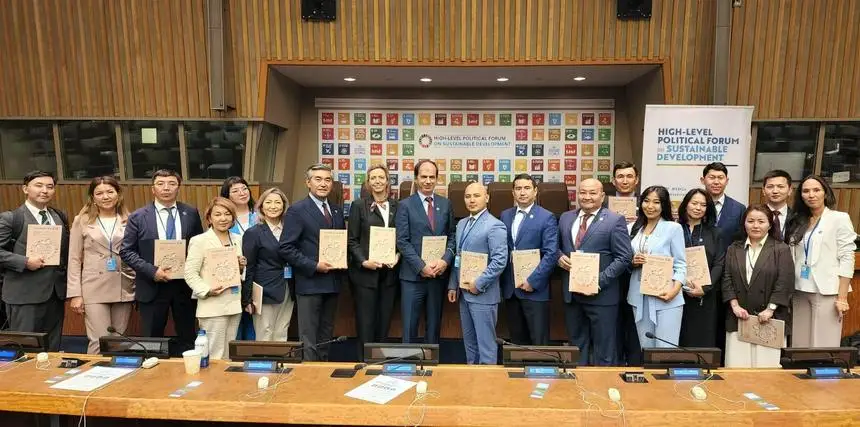
Kazakh and UN officials during a VNR presentation in New York in July. Photo credit: UNDP Kazakhstan
Kazakhstan also took the initiative to establish the UN Regional Center on Sustainable Development Goals for Central Asia and Afghanistan in Almaty, which can serve as an excellent example within the framework of the reform of the UN's regional development system.
Sustainable development is essential for Kazakhstan's long-term well-being, as it supports economic growth, protects the environment, and promotes social responsibility. The political will that Kazakhstan demonstrates and its decades-long partnership with the UN give hope the nation continues to be committed to building a more resilient and prosperous future for its citizens.
Written by Assel Satubaldina